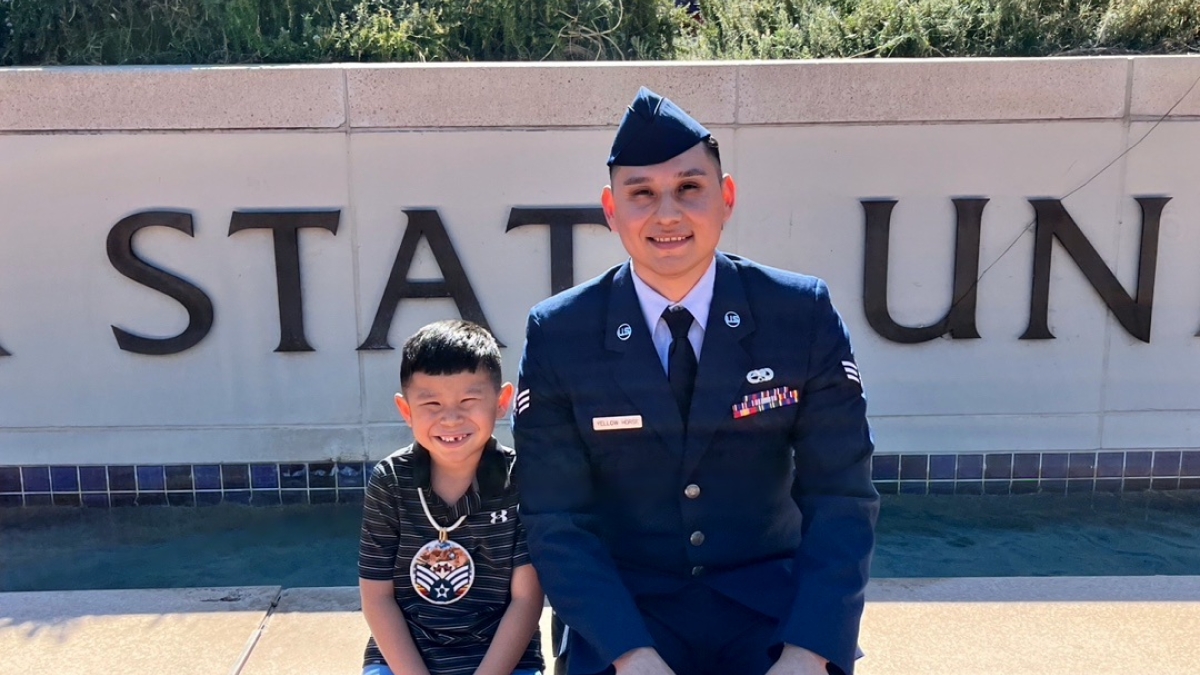Native vet to focus on tribal health with global health master’s degree

Charles Yellow Horse with his son Nathan. Courtesy photo
Editor's note: This story is part of a series of profiles of notable fall 2023 graduates.
Charles Yellow Horse served in the United States Air Force for eight years and then turned to ASU Online for his higher education. Yellow Horse obtained his Bachelor of Science in 2021, and this semester he is graduating with a Master of Science in global health from the School of Human Evolution and Social Change.
“The decision to study global health with a focus on tribal health was a culmination of life experiences that go back to my upbringing on the Navajo Reservation to my time in the United States Air Force and now as a graduate student,” Yellow Horse said.
“Each time in my life, health was significantly present. I experienced traditional and spiritual remedies for a number of ailments on the Navajo Reservation; in the Air Force, consistent physical readiness was a priority in order to meet the demanding work environment; and as a student, my overall health was important, as well as the health of my family.”
Yellow Horse is the recipient of the Fall 2023 University Outstanding Graduate Award for Social Sciences. He was also awarded the Northwest Native American Research Center for Health (NW NARCH) Support Fellowship for his research work with Native Health of Phoenix's Helping Hands program.
ASU News talked with Yellow Horse about his experiences as a student.
Editor's note: Answers have been edited for length and clarity.
Question: Why did you choose ASU for your degree?
Answer: As a non-traditional student, there were many reasons I chose to study at Arizona State University. ... As a husband and father and United States Air Force veteran, I took into account my commitments. ASU offered dedicated support for all aspects of my life, which I was overly excited to discover. The online platform made it much easier to be present to support my family, the American Indian Student Support Services supported me academically as well as culturally, and the Pat Tillman Veterans Center has been a supportive organization for my efforts as a military member through offering community building and recognition of service at events.
Q: Did you participate in any internships or labs?
A: I am currently completing my internship for my global health MS degree with Native Health's Helping Hands program. I am currently serving as a community resources navigator, aiding community members and their families to find resources that address their social needs, like employment, food, financial assistance, education and housing. This program looks to reduce the health inequity gap by providing referrals to address social determinants of health. I also conducted a program evaluation for the Helping Hands program with the goal of discovering ways to improve the program to help facilitate getting community members in contact with the resources they need.
Q: What’s something you learned while at ASU — in the classroom or otherwise — that surprised you or changed your perspective?
A: While at ASU, I was impressed by how much support I received when I had not thought to ask or thought I needed it. The consistent support from faculty and staff really enabled me to succeed in my academic journey at ASU.
Q: Which professor/course taught you the most important lesson while at ASU?
A: I feel as though I have learned meaningful and perspective-altering lessons in each of my courses. Although the course that I value a lot is ASB 526: Survey Topics in Global Nutrition, taught by Assistant Research Scientist Roseanne Schuster. This course allowed me to research in depth about food sovereignty, which is an especially important topic for Native Americans, including myself and Indigenous people around the world. Schuster’s teaching method of hosting initiative-taking discussions via an online platform called Perusall really allowed for me to grow my perspective and complete concrete research work on traditional food systems as a means to reducing food insecurity among Indigenous peoples.
Q: What are your plans after graduation?
A: I am currently navigating many pathways going forward as I search for a position, but one goal I will pursue is giving back to the Native American, veteran and student communities that have supported me in my academic journey.
More Health and medicine

Bird flu: Your questions on symptoms, spread and safety answered
Bird flu is no longer only “for the birds.”Infections have expanded beyond wild birds and poultry to a range of animals — from…

Making medicine side-effect free
Many drugs that address medical conditions can come with serious side effects. In drug commercials, the litany of potential side…

Diagnostic research happening at ASU focused on detecting diseases earlier to save lives
It was one of America’s founding fathers, Benjamin Franklin, who may have foreshadowed today’s health care innovation when he…

